Creating a Corporate Social Responsibility Strategy: Jordanian Telecom
VerifiedAdded on 2023/06/09
|53
|18145
|422
Report
AI Summary
This report provides an in-depth analysis of Corporate Social Responsibility (CSR) and its application within the Jordanian Telecom Sector. It explores the concept of CSR, its importance, and various theories related to it, including stakeholder theory, business ethics theory, and shareholder value theory. The report investigates factors contributing to successful CSR implementation and examines alternative strategies for the Jordanian context. A detailed methodology section outlines the research philosophy, design, approach, and data collection methods used. The analysis and findings section presents key insights, followed by a discussion linking the research questions to the findings. The report concludes with recommendations for improving CSR practices in the Jordanian Telecom Sector and suggests future research directions, emphasizing the role of ethical considerations and societal development in enhancing the sector's reputation and financial performance.
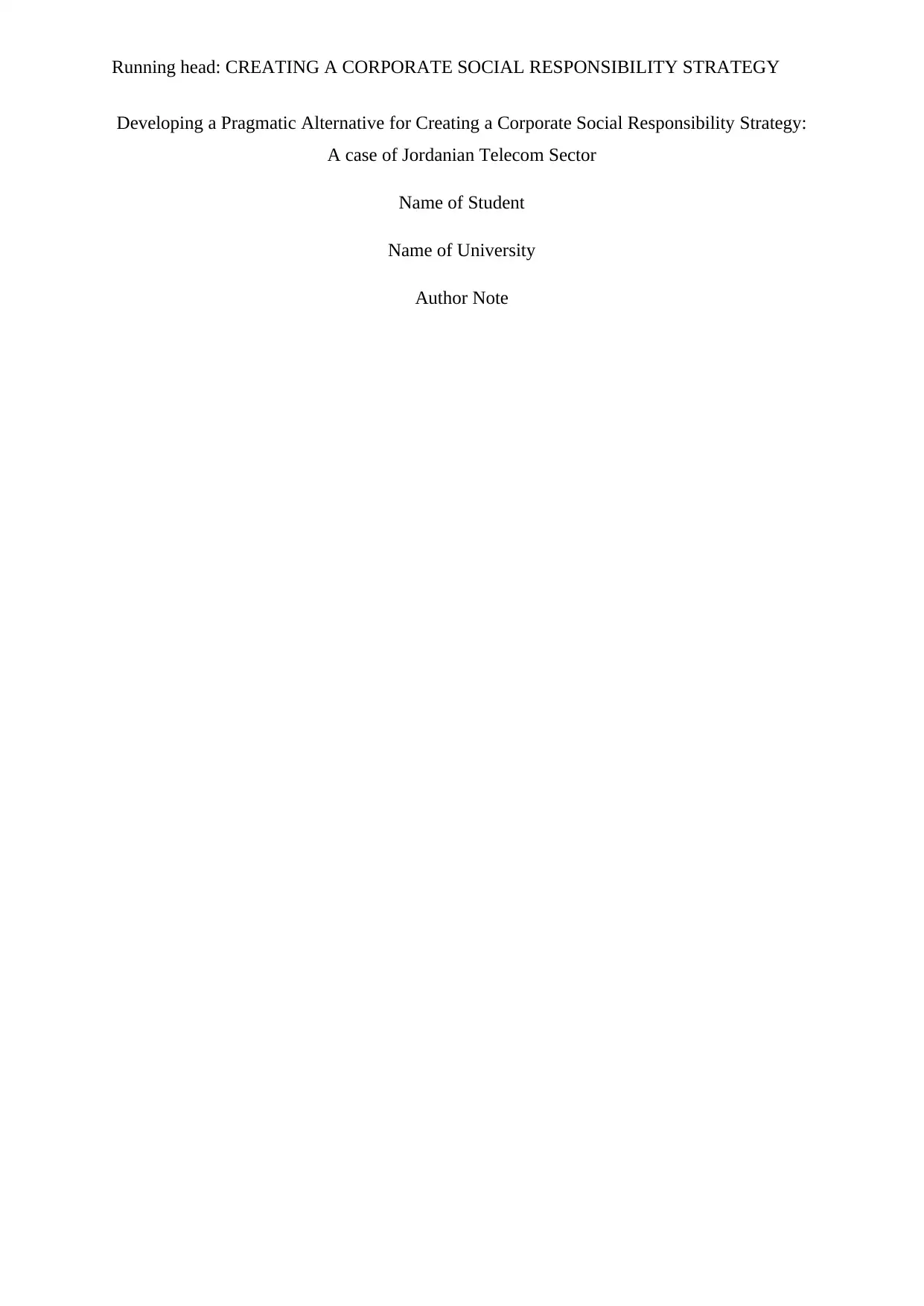
Running head: CREATING A CORPORATE SOCIAL RESPONSIBILITY STRATEGY
Developing a Pragmatic Alternative for Creating a Corporate Social Responsibility Strategy:
A case of Jordanian Telecom Sector
Name of Student
Name of University
Author Note
Developing a Pragmatic Alternative for Creating a Corporate Social Responsibility Strategy:
A case of Jordanian Telecom Sector
Name of Student
Name of University
Author Note
Paraphrase This Document
Need a fresh take? Get an instant paraphrase of this document with our AI Paraphraser

1
CREATING A CORPORATE SOCIAL RESPONSIBILITY STRATEGY
Acknowledgement
Thank you to all of those who have helped listened and encouraged me throughout this study.
I am indebted to my supervisor ……………………. whose guidance, advice and patience
have been immeasurable. My sincere thanks to all members of the…………… [Mention your
university/college name], both staff and students, whose continuous support have made this
thesis possible.
I would like to thank all of the participants in the study: students, teachers and Local
Education Authorities, for the time and help given throughout. Without their participation,
this research would not have been possible. In this context, I am also thankful to them, whose
research work helped me to execute this paper well.
Finally, I thank my family, without whom this thesis would not have been started or
completed! Your encouragement and support have never faltered; thank you.
CREATING A CORPORATE SOCIAL RESPONSIBILITY STRATEGY
Acknowledgement
Thank you to all of those who have helped listened and encouraged me throughout this study.
I am indebted to my supervisor ……………………. whose guidance, advice and patience
have been immeasurable. My sincere thanks to all members of the…………… [Mention your
university/college name], both staff and students, whose continuous support have made this
thesis possible.
I would like to thank all of the participants in the study: students, teachers and Local
Education Authorities, for the time and help given throughout. Without their participation,
this research would not have been possible. In this context, I am also thankful to them, whose
research work helped me to execute this paper well.
Finally, I thank my family, without whom this thesis would not have been started or
completed! Your encouragement and support have never faltered; thank you.
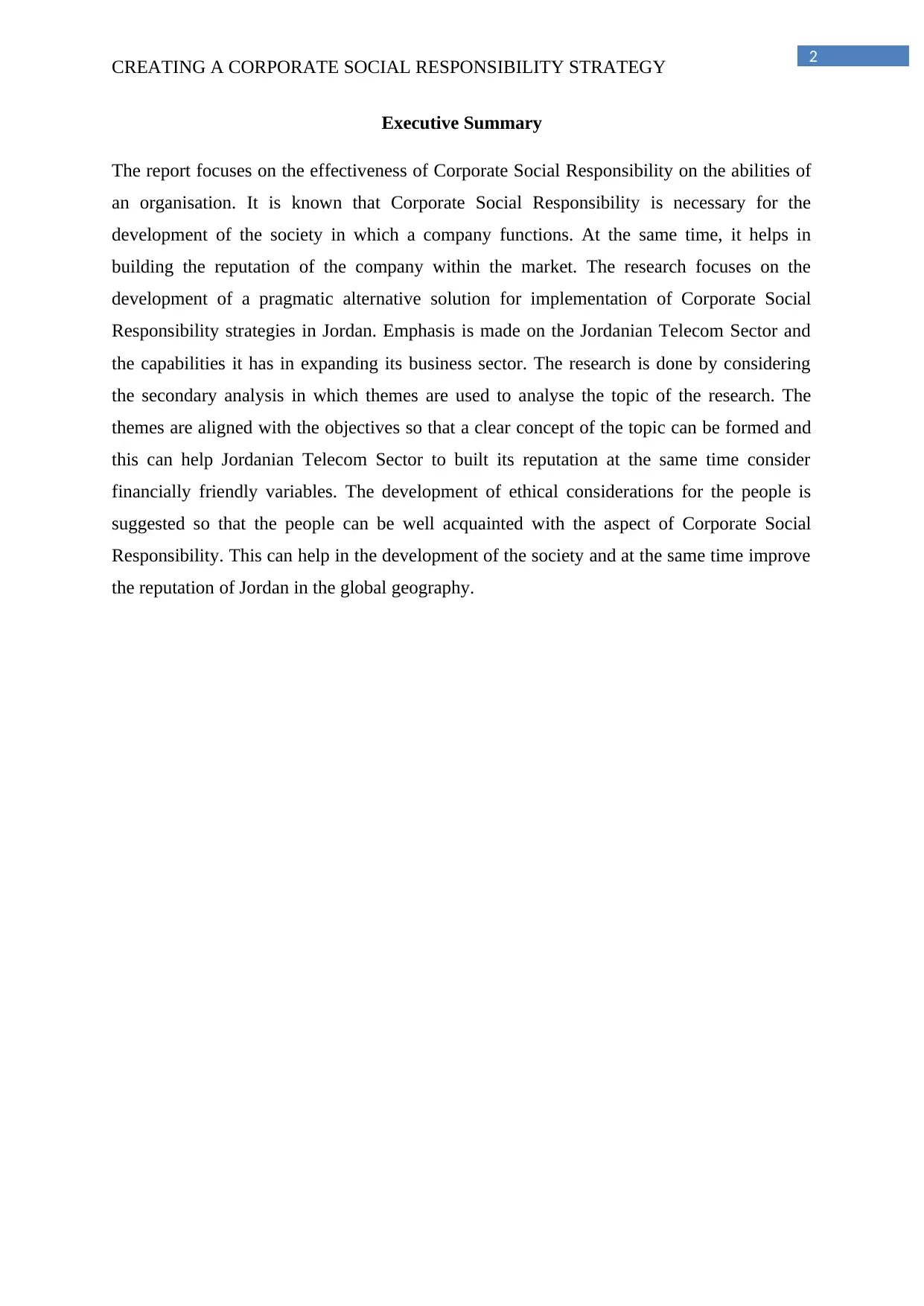
2
CREATING A CORPORATE SOCIAL RESPONSIBILITY STRATEGY
Executive Summary
The report focuses on the effectiveness of Corporate Social Responsibility on the abilities of
an organisation. It is known that Corporate Social Responsibility is necessary for the
development of the society in which a company functions. At the same time, it helps in
building the reputation of the company within the market. The research focuses on the
development of a pragmatic alternative solution for implementation of Corporate Social
Responsibility strategies in Jordan. Emphasis is made on the Jordanian Telecom Sector and
the capabilities it has in expanding its business sector. The research is done by considering
the secondary analysis in which themes are used to analyse the topic of the research. The
themes are aligned with the objectives so that a clear concept of the topic can be formed and
this can help Jordanian Telecom Sector to built its reputation at the same time consider
financially friendly variables. The development of ethical considerations for the people is
suggested so that the people can be well acquainted with the aspect of Corporate Social
Responsibility. This can help in the development of the society and at the same time improve
the reputation of Jordan in the global geography.
CREATING A CORPORATE SOCIAL RESPONSIBILITY STRATEGY
Executive Summary
The report focuses on the effectiveness of Corporate Social Responsibility on the abilities of
an organisation. It is known that Corporate Social Responsibility is necessary for the
development of the society in which a company functions. At the same time, it helps in
building the reputation of the company within the market. The research focuses on the
development of a pragmatic alternative solution for implementation of Corporate Social
Responsibility strategies in Jordan. Emphasis is made on the Jordanian Telecom Sector and
the capabilities it has in expanding its business sector. The research is done by considering
the secondary analysis in which themes are used to analyse the topic of the research. The
themes are aligned with the objectives so that a clear concept of the topic can be formed and
this can help Jordanian Telecom Sector to built its reputation at the same time consider
financially friendly variables. The development of ethical considerations for the people is
suggested so that the people can be well acquainted with the aspect of Corporate Social
Responsibility. This can help in the development of the society and at the same time improve
the reputation of Jordan in the global geography.
⊘ This is a preview!⊘
Do you want full access?
Subscribe today to unlock all pages.

Trusted by 1+ million students worldwide
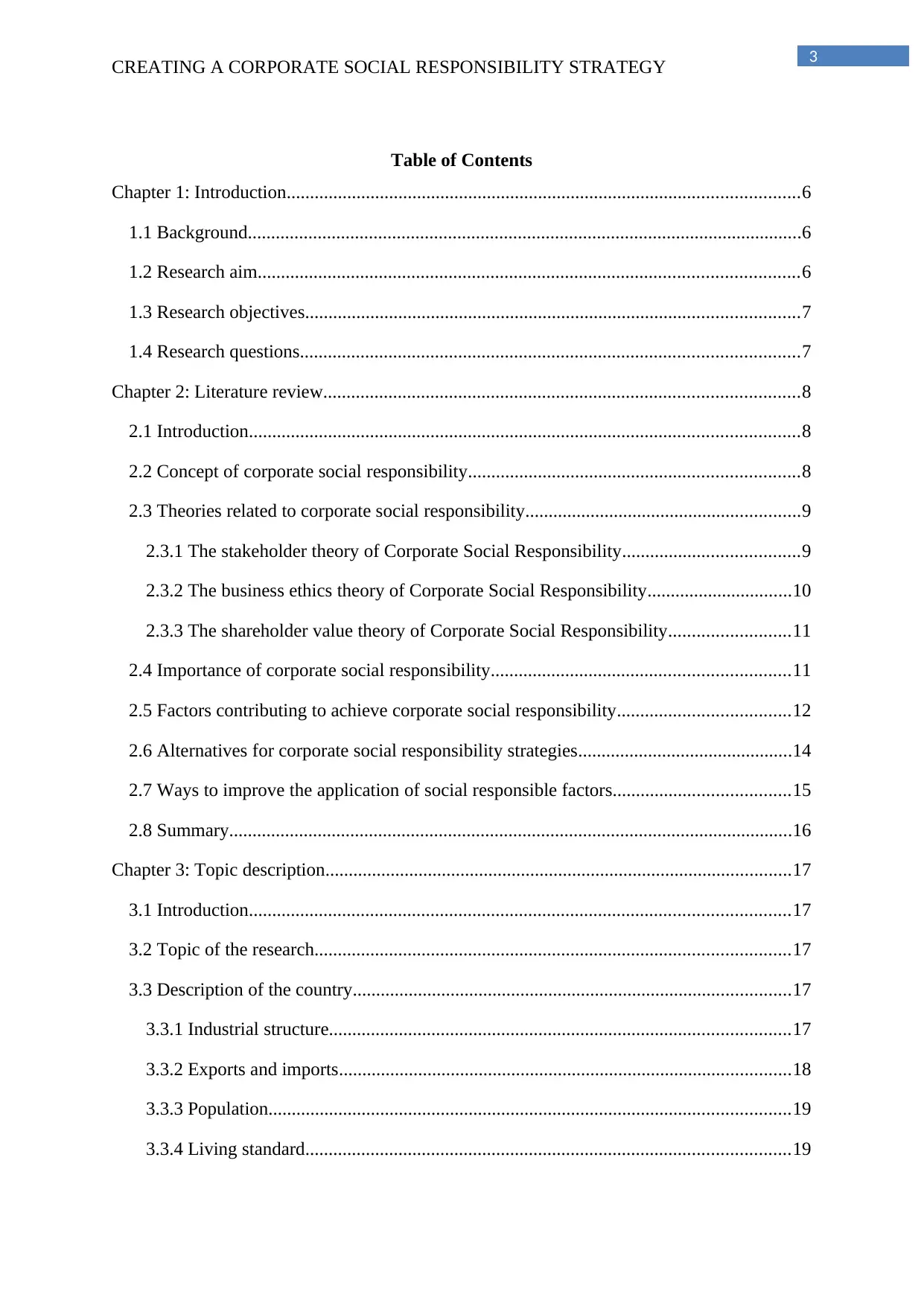
3
CREATING A CORPORATE SOCIAL RESPONSIBILITY STRATEGY
Table of Contents
Chapter 1: Introduction..............................................................................................................6
1.1 Background.......................................................................................................................6
1.2 Research aim....................................................................................................................6
1.3 Research objectives..........................................................................................................7
1.4 Research questions...........................................................................................................7
Chapter 2: Literature review......................................................................................................8
2.1 Introduction......................................................................................................................8
2.2 Concept of corporate social responsibility.......................................................................8
2.3 Theories related to corporate social responsibility...........................................................9
2.3.1 The stakeholder theory of Corporate Social Responsibility......................................9
2.3.2 The business ethics theory of Corporate Social Responsibility...............................10
2.3.3 The shareholder value theory of Corporate Social Responsibility..........................11
2.4 Importance of corporate social responsibility................................................................11
2.5 Factors contributing to achieve corporate social responsibility.....................................12
2.6 Alternatives for corporate social responsibility strategies..............................................14
2.7 Ways to improve the application of social responsible factors......................................15
2.8 Summary.........................................................................................................................16
Chapter 3: Topic description....................................................................................................17
3.1 Introduction....................................................................................................................17
3.2 Topic of the research......................................................................................................17
3.3 Description of the country..............................................................................................17
3.3.1 Industrial structure...................................................................................................17
3.3.2 Exports and imports.................................................................................................18
3.3.3 Population................................................................................................................19
3.3.4 Living standard........................................................................................................19
CREATING A CORPORATE SOCIAL RESPONSIBILITY STRATEGY
Table of Contents
Chapter 1: Introduction..............................................................................................................6
1.1 Background.......................................................................................................................6
1.2 Research aim....................................................................................................................6
1.3 Research objectives..........................................................................................................7
1.4 Research questions...........................................................................................................7
Chapter 2: Literature review......................................................................................................8
2.1 Introduction......................................................................................................................8
2.2 Concept of corporate social responsibility.......................................................................8
2.3 Theories related to corporate social responsibility...........................................................9
2.3.1 The stakeholder theory of Corporate Social Responsibility......................................9
2.3.2 The business ethics theory of Corporate Social Responsibility...............................10
2.3.3 The shareholder value theory of Corporate Social Responsibility..........................11
2.4 Importance of corporate social responsibility................................................................11
2.5 Factors contributing to achieve corporate social responsibility.....................................12
2.6 Alternatives for corporate social responsibility strategies..............................................14
2.7 Ways to improve the application of social responsible factors......................................15
2.8 Summary.........................................................................................................................16
Chapter 3: Topic description....................................................................................................17
3.1 Introduction....................................................................................................................17
3.2 Topic of the research......................................................................................................17
3.3 Description of the country..............................................................................................17
3.3.1 Industrial structure...................................................................................................17
3.3.2 Exports and imports.................................................................................................18
3.3.3 Population................................................................................................................19
3.3.4 Living standard........................................................................................................19
Paraphrase This Document
Need a fresh take? Get an instant paraphrase of this document with our AI Paraphraser
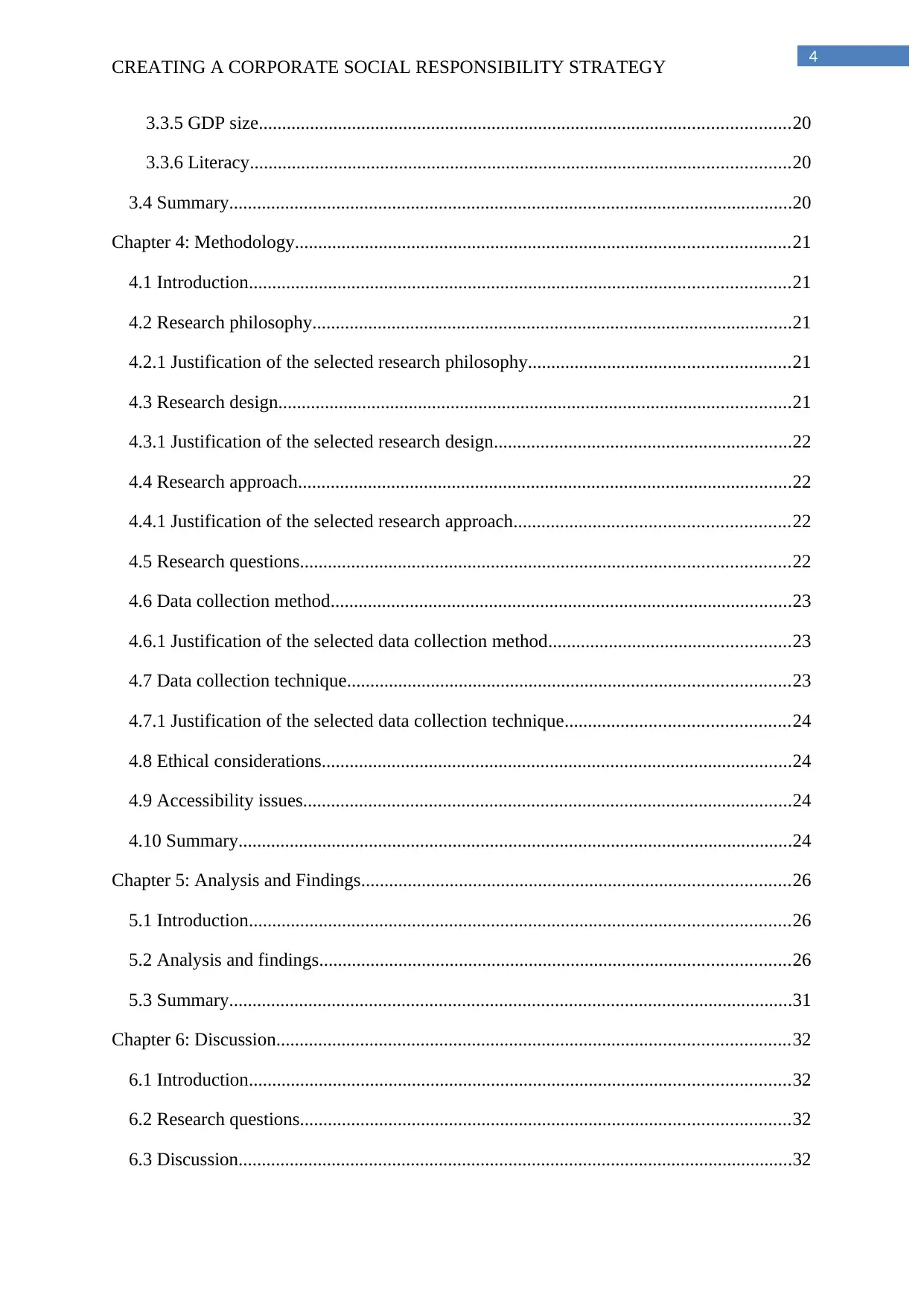
4
CREATING A CORPORATE SOCIAL RESPONSIBILITY STRATEGY
3.3.5 GDP size..................................................................................................................20
3.3.6 Literacy....................................................................................................................20
3.4 Summary.........................................................................................................................20
Chapter 4: Methodology..........................................................................................................21
4.1 Introduction....................................................................................................................21
4.2 Research philosophy.......................................................................................................21
4.2.1 Justification of the selected research philosophy........................................................21
4.3 Research design..............................................................................................................21
4.3.1 Justification of the selected research design................................................................22
4.4 Research approach..........................................................................................................22
4.4.1 Justification of the selected research approach...........................................................22
4.5 Research questions.........................................................................................................22
4.6 Data collection method...................................................................................................23
4.6.1 Justification of the selected data collection method....................................................23
4.7 Data collection technique...............................................................................................23
4.7.1 Justification of the selected data collection technique................................................24
4.8 Ethical considerations.....................................................................................................24
4.9 Accessibility issues.........................................................................................................24
4.10 Summary.......................................................................................................................24
Chapter 5: Analysis and Findings............................................................................................26
5.1 Introduction....................................................................................................................26
5.2 Analysis and findings.....................................................................................................26
5.3 Summary.........................................................................................................................31
Chapter 6: Discussion..............................................................................................................32
6.1 Introduction....................................................................................................................32
6.2 Research questions.........................................................................................................32
6.3 Discussion.......................................................................................................................32
CREATING A CORPORATE SOCIAL RESPONSIBILITY STRATEGY
3.3.5 GDP size..................................................................................................................20
3.3.6 Literacy....................................................................................................................20
3.4 Summary.........................................................................................................................20
Chapter 4: Methodology..........................................................................................................21
4.1 Introduction....................................................................................................................21
4.2 Research philosophy.......................................................................................................21
4.2.1 Justification of the selected research philosophy........................................................21
4.3 Research design..............................................................................................................21
4.3.1 Justification of the selected research design................................................................22
4.4 Research approach..........................................................................................................22
4.4.1 Justification of the selected research approach...........................................................22
4.5 Research questions.........................................................................................................22
4.6 Data collection method...................................................................................................23
4.6.1 Justification of the selected data collection method....................................................23
4.7 Data collection technique...............................................................................................23
4.7.1 Justification of the selected data collection technique................................................24
4.8 Ethical considerations.....................................................................................................24
4.9 Accessibility issues.........................................................................................................24
4.10 Summary.......................................................................................................................24
Chapter 5: Analysis and Findings............................................................................................26
5.1 Introduction....................................................................................................................26
5.2 Analysis and findings.....................................................................................................26
5.3 Summary.........................................................................................................................31
Chapter 6: Discussion..............................................................................................................32
6.1 Introduction....................................................................................................................32
6.2 Research questions.........................................................................................................32
6.3 Discussion.......................................................................................................................32

5
CREATING A CORPORATE SOCIAL RESPONSIBILITY STRATEGY
6.4 Summary.........................................................................................................................36
Chapter 7: Conclusion..............................................................................................................37
7.1 Conclusion......................................................................................................................37
7.2 Linking with the objectives.......................................................................................38
7.3 Recommendations..........................................................................................................40
7.4 Future scope of study......................................................................................................41
Bibliography.............................................................................................................................42
CREATING A CORPORATE SOCIAL RESPONSIBILITY STRATEGY
6.4 Summary.........................................................................................................................36
Chapter 7: Conclusion..............................................................................................................37
7.1 Conclusion......................................................................................................................37
7.2 Linking with the objectives.......................................................................................38
7.3 Recommendations..........................................................................................................40
7.4 Future scope of study......................................................................................................41
Bibliography.............................................................................................................................42
⊘ This is a preview!⊘
Do you want full access?
Subscribe today to unlock all pages.

Trusted by 1+ million students worldwide
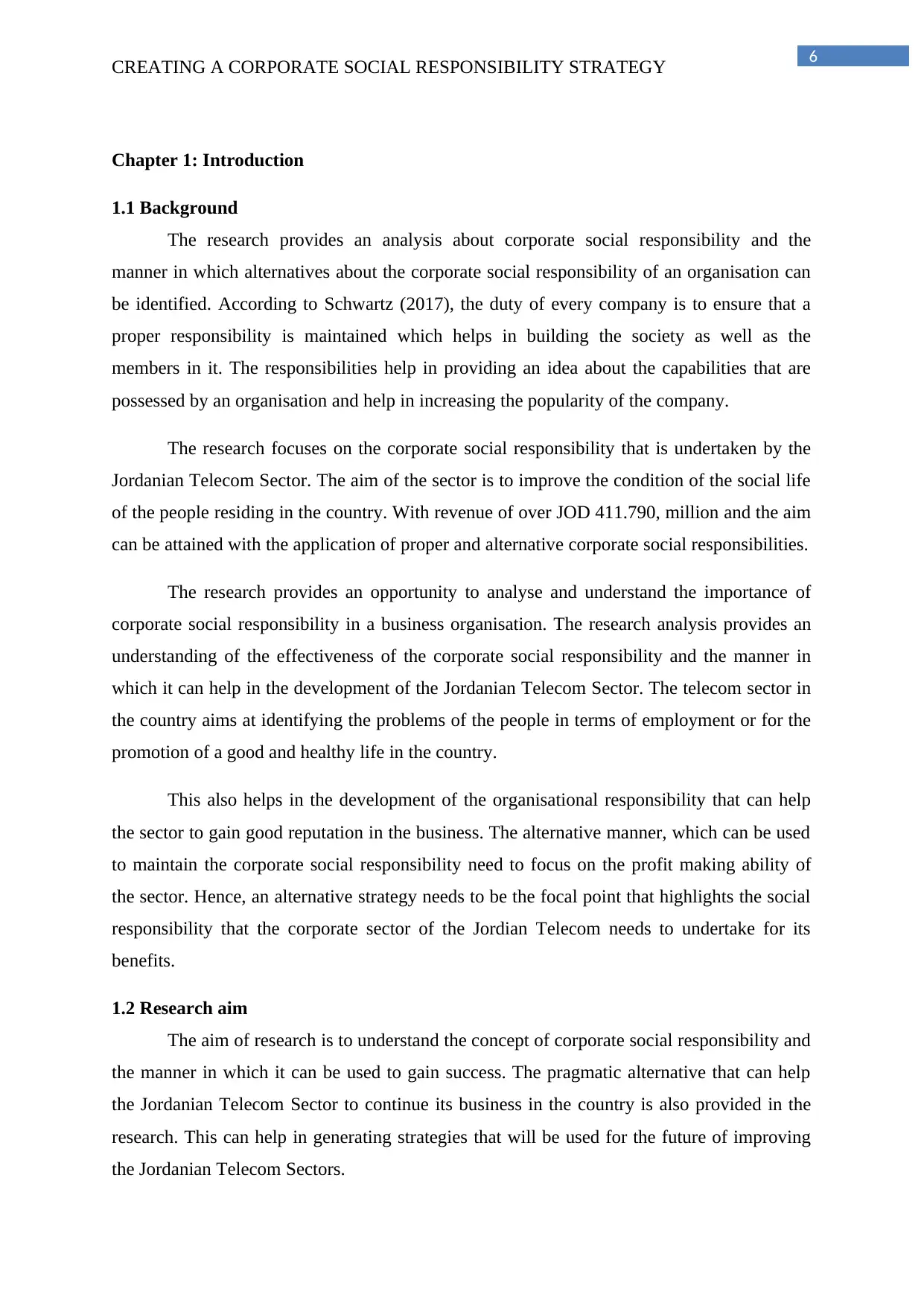
6
CREATING A CORPORATE SOCIAL RESPONSIBILITY STRATEGY
Chapter 1: Introduction
1.1 Background
The research provides an analysis about corporate social responsibility and the
manner in which alternatives about the corporate social responsibility of an organisation can
be identified. According to Schwartz (2017), the duty of every company is to ensure that a
proper responsibility is maintained which helps in building the society as well as the
members in it. The responsibilities help in providing an idea about the capabilities that are
possessed by an organisation and help in increasing the popularity of the company.
The research focuses on the corporate social responsibility that is undertaken by the
Jordanian Telecom Sector. The aim of the sector is to improve the condition of the social life
of the people residing in the country. With revenue of over JOD 411.790, million and the aim
can be attained with the application of proper and alternative corporate social responsibilities.
The research provides an opportunity to analyse and understand the importance of
corporate social responsibility in a business organisation. The research analysis provides an
understanding of the effectiveness of the corporate social responsibility and the manner in
which it can help in the development of the Jordanian Telecom Sector. The telecom sector in
the country aims at identifying the problems of the people in terms of employment or for the
promotion of a good and healthy life in the country.
This also helps in the development of the organisational responsibility that can help
the sector to gain good reputation in the business. The alternative manner, which can be used
to maintain the corporate social responsibility need to focus on the profit making ability of
the sector. Hence, an alternative strategy needs to be the focal point that highlights the social
responsibility that the corporate sector of the Jordian Telecom needs to undertake for its
benefits.
1.2 Research aim
The aim of research is to understand the concept of corporate social responsibility and
the manner in which it can be used to gain success. The pragmatic alternative that can help
the Jordanian Telecom Sector to continue its business in the country is also provided in the
research. This can help in generating strategies that will be used for the future of improving
the Jordanian Telecom Sectors.
CREATING A CORPORATE SOCIAL RESPONSIBILITY STRATEGY
Chapter 1: Introduction
1.1 Background
The research provides an analysis about corporate social responsibility and the
manner in which alternatives about the corporate social responsibility of an organisation can
be identified. According to Schwartz (2017), the duty of every company is to ensure that a
proper responsibility is maintained which helps in building the society as well as the
members in it. The responsibilities help in providing an idea about the capabilities that are
possessed by an organisation and help in increasing the popularity of the company.
The research focuses on the corporate social responsibility that is undertaken by the
Jordanian Telecom Sector. The aim of the sector is to improve the condition of the social life
of the people residing in the country. With revenue of over JOD 411.790, million and the aim
can be attained with the application of proper and alternative corporate social responsibilities.
The research provides an opportunity to analyse and understand the importance of
corporate social responsibility in a business organisation. The research analysis provides an
understanding of the effectiveness of the corporate social responsibility and the manner in
which it can help in the development of the Jordanian Telecom Sector. The telecom sector in
the country aims at identifying the problems of the people in terms of employment or for the
promotion of a good and healthy life in the country.
This also helps in the development of the organisational responsibility that can help
the sector to gain good reputation in the business. The alternative manner, which can be used
to maintain the corporate social responsibility need to focus on the profit making ability of
the sector. Hence, an alternative strategy needs to be the focal point that highlights the social
responsibility that the corporate sector of the Jordian Telecom needs to undertake for its
benefits.
1.2 Research aim
The aim of research is to understand the concept of corporate social responsibility and
the manner in which it can be used to gain success. The pragmatic alternative that can help
the Jordanian Telecom Sector to continue its business in the country is also provided in the
research. This can help in generating strategies that will be used for the future of improving
the Jordanian Telecom Sectors.
Paraphrase This Document
Need a fresh take? Get an instant paraphrase of this document with our AI Paraphraser
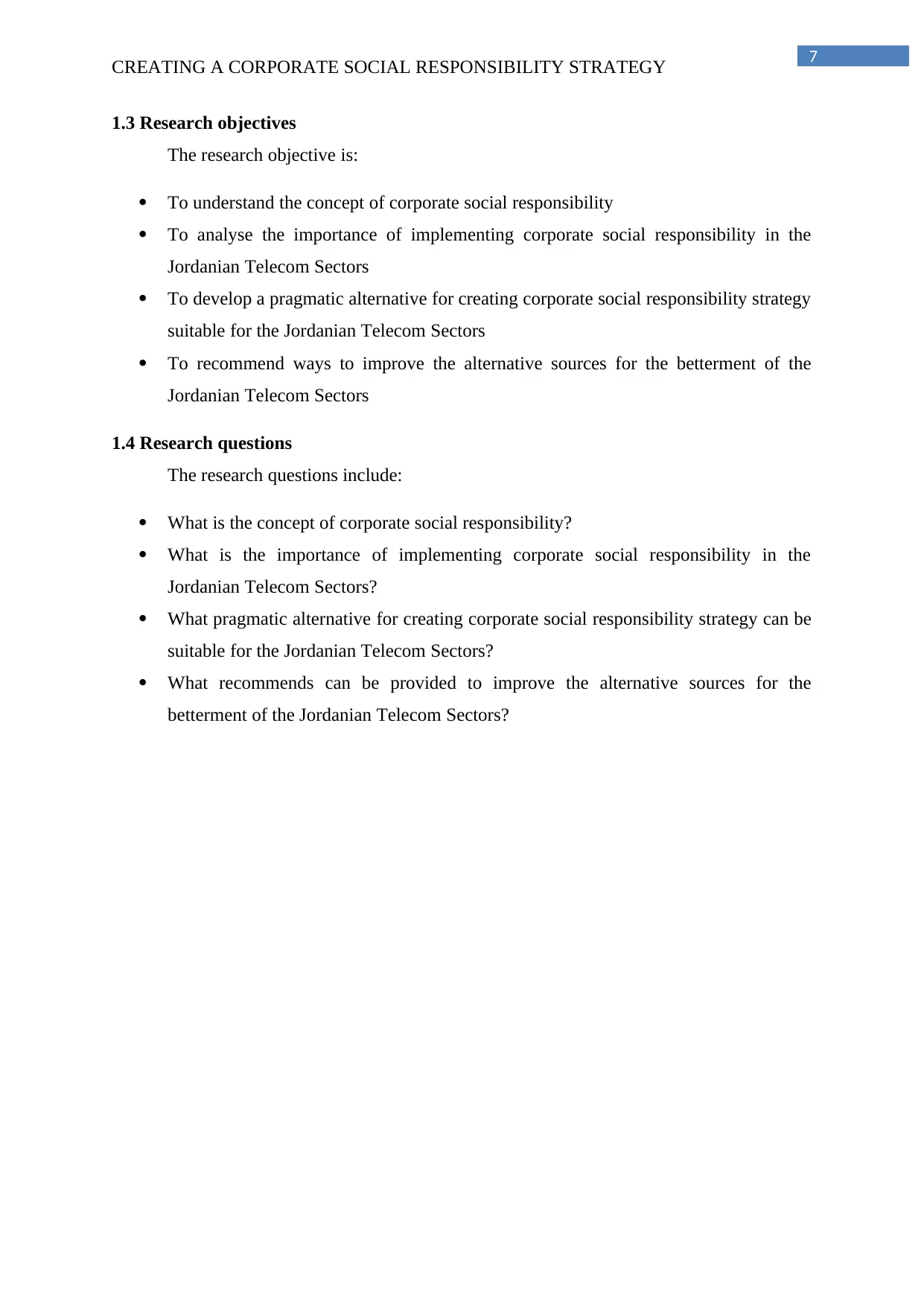
7
CREATING A CORPORATE SOCIAL RESPONSIBILITY STRATEGY
1.3 Research objectives
The research objective is:
To understand the concept of corporate social responsibility
To analyse the importance of implementing corporate social responsibility in the
Jordanian Telecom Sectors
To develop a pragmatic alternative for creating corporate social responsibility strategy
suitable for the Jordanian Telecom Sectors
To recommend ways to improve the alternative sources for the betterment of the
Jordanian Telecom Sectors
1.4 Research questions
The research questions include:
What is the concept of corporate social responsibility?
What is the importance of implementing corporate social responsibility in the
Jordanian Telecom Sectors?
What pragmatic alternative for creating corporate social responsibility strategy can be
suitable for the Jordanian Telecom Sectors?
What recommends can be provided to improve the alternative sources for the
betterment of the Jordanian Telecom Sectors?
CREATING A CORPORATE SOCIAL RESPONSIBILITY STRATEGY
1.3 Research objectives
The research objective is:
To understand the concept of corporate social responsibility
To analyse the importance of implementing corporate social responsibility in the
Jordanian Telecom Sectors
To develop a pragmatic alternative for creating corporate social responsibility strategy
suitable for the Jordanian Telecom Sectors
To recommend ways to improve the alternative sources for the betterment of the
Jordanian Telecom Sectors
1.4 Research questions
The research questions include:
What is the concept of corporate social responsibility?
What is the importance of implementing corporate social responsibility in the
Jordanian Telecom Sectors?
What pragmatic alternative for creating corporate social responsibility strategy can be
suitable for the Jordanian Telecom Sectors?
What recommends can be provided to improve the alternative sources for the
betterment of the Jordanian Telecom Sectors?
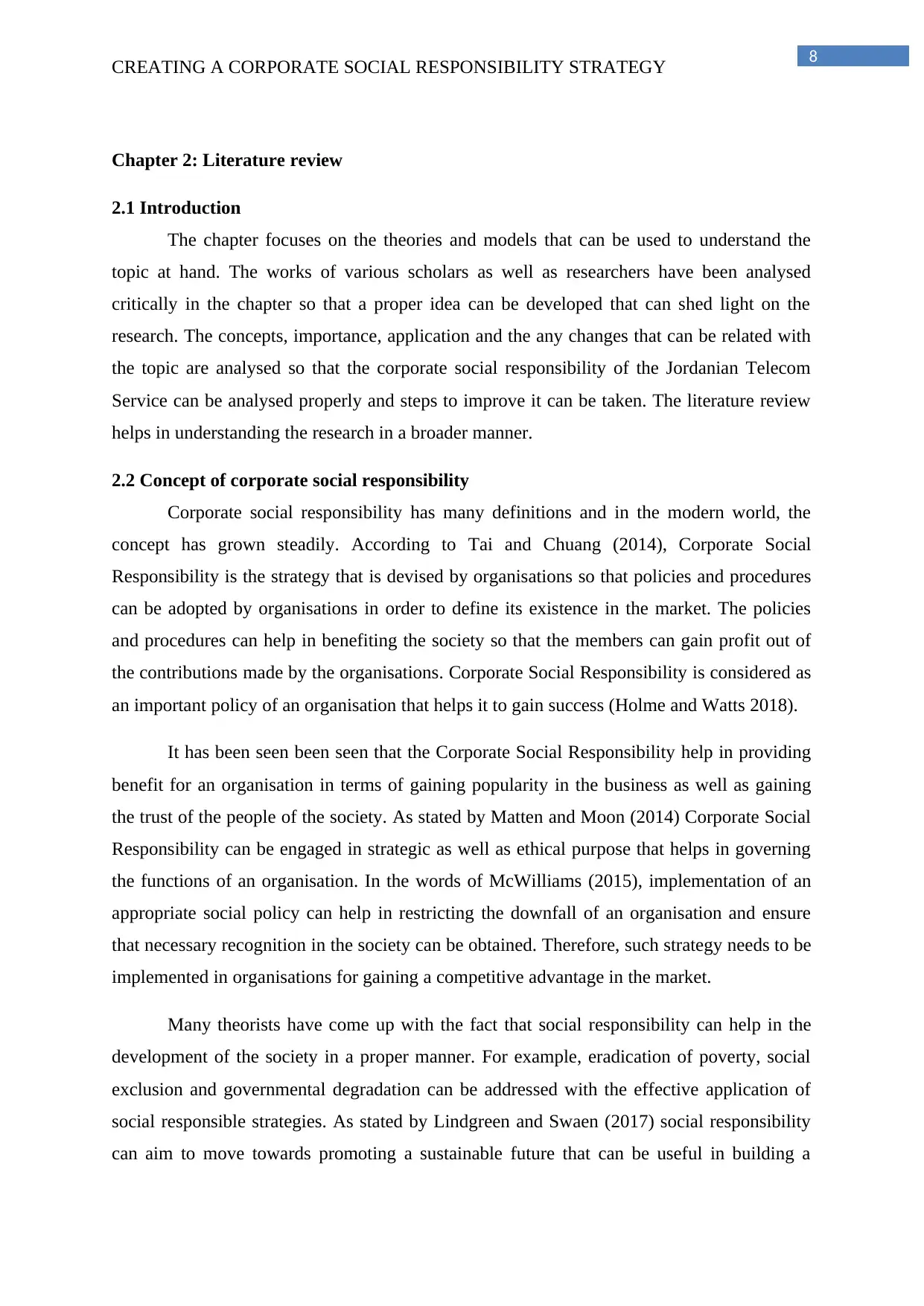
8
CREATING A CORPORATE SOCIAL RESPONSIBILITY STRATEGY
Chapter 2: Literature review
2.1 Introduction
The chapter focuses on the theories and models that can be used to understand the
topic at hand. The works of various scholars as well as researchers have been analysed
critically in the chapter so that a proper idea can be developed that can shed light on the
research. The concepts, importance, application and the any changes that can be related with
the topic are analysed so that the corporate social responsibility of the Jordanian Telecom
Service can be analysed properly and steps to improve it can be taken. The literature review
helps in understanding the research in a broader manner.
2.2 Concept of corporate social responsibility
Corporate social responsibility has many definitions and in the modern world, the
concept has grown steadily. According to Tai and Chuang (2014), Corporate Social
Responsibility is the strategy that is devised by organisations so that policies and procedures
can be adopted by organisations in order to define its existence in the market. The policies
and procedures can help in benefiting the society so that the members can gain profit out of
the contributions made by the organisations. Corporate Social Responsibility is considered as
an important policy of an organisation that helps it to gain success (Holme and Watts 2018).
It has been seen been seen that the Corporate Social Responsibility help in providing
benefit for an organisation in terms of gaining popularity in the business as well as gaining
the trust of the people of the society. As stated by Matten and Moon (2014) Corporate Social
Responsibility can be engaged in strategic as well as ethical purpose that helps in governing
the functions of an organisation. In the words of McWilliams (2015), implementation of an
appropriate social policy can help in restricting the downfall of an organisation and ensure
that necessary recognition in the society can be obtained. Therefore, such strategy needs to be
implemented in organisations for gaining a competitive advantage in the market.
Many theorists have come up with the fact that social responsibility can help in the
development of the society in a proper manner. For example, eradication of poverty, social
exclusion and governmental degradation can be addressed with the effective application of
social responsible strategies. As stated by Lindgreen and Swaen (2017) social responsibility
can aim to move towards promoting a sustainable future that can be useful in building a
CREATING A CORPORATE SOCIAL RESPONSIBILITY STRATEGY
Chapter 2: Literature review
2.1 Introduction
The chapter focuses on the theories and models that can be used to understand the
topic at hand. The works of various scholars as well as researchers have been analysed
critically in the chapter so that a proper idea can be developed that can shed light on the
research. The concepts, importance, application and the any changes that can be related with
the topic are analysed so that the corporate social responsibility of the Jordanian Telecom
Service can be analysed properly and steps to improve it can be taken. The literature review
helps in understanding the research in a broader manner.
2.2 Concept of corporate social responsibility
Corporate social responsibility has many definitions and in the modern world, the
concept has grown steadily. According to Tai and Chuang (2014), Corporate Social
Responsibility is the strategy that is devised by organisations so that policies and procedures
can be adopted by organisations in order to define its existence in the market. The policies
and procedures can help in benefiting the society so that the members can gain profit out of
the contributions made by the organisations. Corporate Social Responsibility is considered as
an important policy of an organisation that helps it to gain success (Holme and Watts 2018).
It has been seen been seen that the Corporate Social Responsibility help in providing
benefit for an organisation in terms of gaining popularity in the business as well as gaining
the trust of the people of the society. As stated by Matten and Moon (2014) Corporate Social
Responsibility can be engaged in strategic as well as ethical purpose that helps in governing
the functions of an organisation. In the words of McWilliams (2015), implementation of an
appropriate social policy can help in restricting the downfall of an organisation and ensure
that necessary recognition in the society can be obtained. Therefore, such strategy needs to be
implemented in organisations for gaining a competitive advantage in the market.
Many theorists have come up with the fact that social responsibility can help in the
development of the society in a proper manner. For example, eradication of poverty, social
exclusion and governmental degradation can be addressed with the effective application of
social responsible strategies. As stated by Lindgreen and Swaen (2017) social responsibility
can aim to move towards promoting a sustainable future that can be useful in building a
⊘ This is a preview!⊘
Do you want full access?
Subscribe today to unlock all pages.

Trusted by 1+ million students worldwide
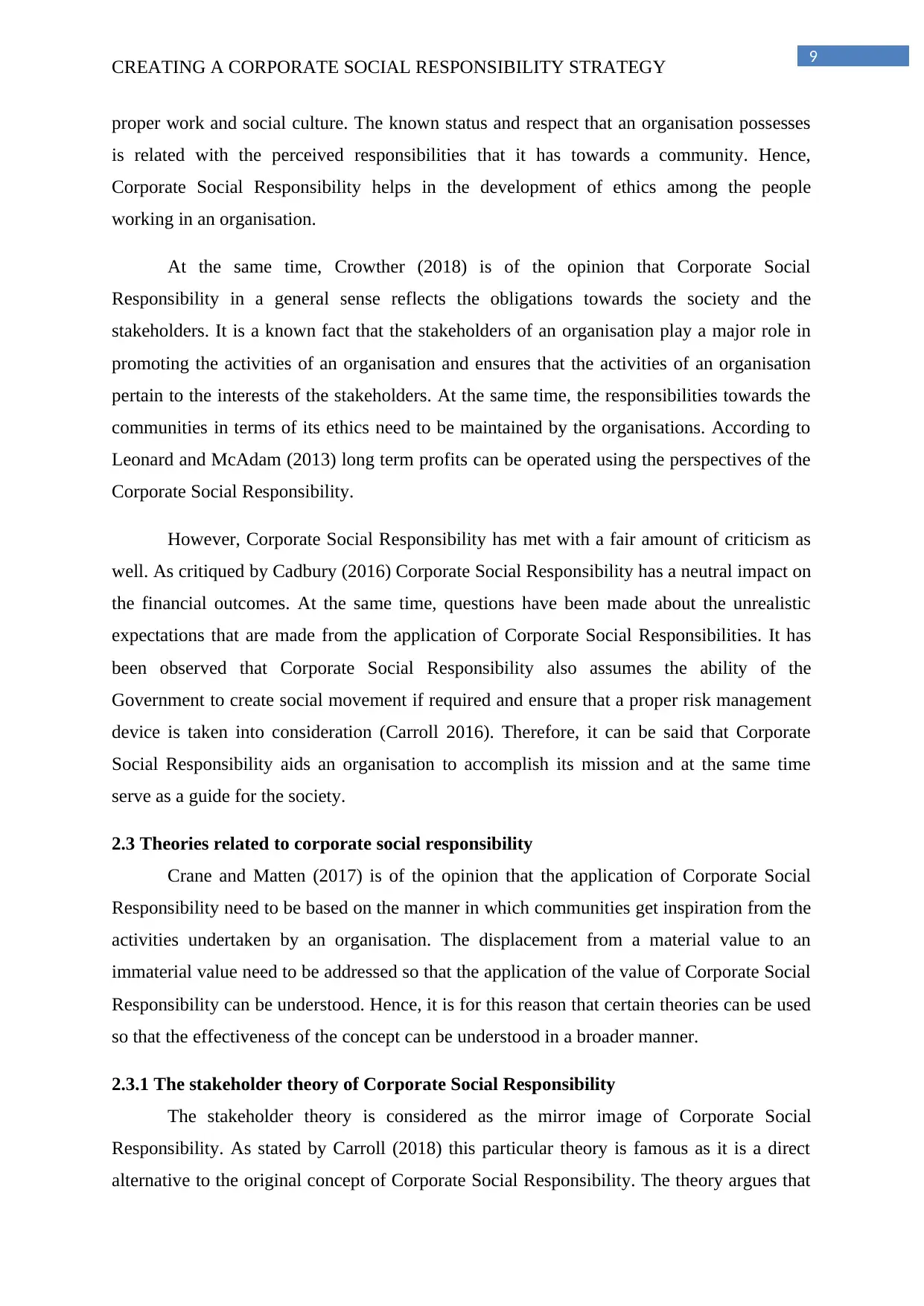
9
CREATING A CORPORATE SOCIAL RESPONSIBILITY STRATEGY
proper work and social culture. The known status and respect that an organisation possesses
is related with the perceived responsibilities that it has towards a community. Hence,
Corporate Social Responsibility helps in the development of ethics among the people
working in an organisation.
At the same time, Crowther (2018) is of the opinion that Corporate Social
Responsibility in a general sense reflects the obligations towards the society and the
stakeholders. It is a known fact that the stakeholders of an organisation play a major role in
promoting the activities of an organisation and ensures that the activities of an organisation
pertain to the interests of the stakeholders. At the same time, the responsibilities towards the
communities in terms of its ethics need to be maintained by the organisations. According to
Leonard and McAdam (2013) long term profits can be operated using the perspectives of the
Corporate Social Responsibility.
However, Corporate Social Responsibility has met with a fair amount of criticism as
well. As critiqued by Cadbury (2016) Corporate Social Responsibility has a neutral impact on
the financial outcomes. At the same time, questions have been made about the unrealistic
expectations that are made from the application of Corporate Social Responsibilities. It has
been observed that Corporate Social Responsibility also assumes the ability of the
Government to create social movement if required and ensure that a proper risk management
device is taken into consideration (Carroll 2016). Therefore, it can be said that Corporate
Social Responsibility aids an organisation to accomplish its mission and at the same time
serve as a guide for the society.
2.3 Theories related to corporate social responsibility
Crane and Matten (2017) is of the opinion that the application of Corporate Social
Responsibility need to be based on the manner in which communities get inspiration from the
activities undertaken by an organisation. The displacement from a material value to an
immaterial value need to be addressed so that the application of the value of Corporate Social
Responsibility can be understood. Hence, it is for this reason that certain theories can be used
so that the effectiveness of the concept can be understood in a broader manner.
2.3.1 The stakeholder theory of Corporate Social Responsibility
The stakeholder theory is considered as the mirror image of Corporate Social
Responsibility. As stated by Carroll (2018) this particular theory is famous as it is a direct
alternative to the original concept of Corporate Social Responsibility. The theory argues that
CREATING A CORPORATE SOCIAL RESPONSIBILITY STRATEGY
proper work and social culture. The known status and respect that an organisation possesses
is related with the perceived responsibilities that it has towards a community. Hence,
Corporate Social Responsibility helps in the development of ethics among the people
working in an organisation.
At the same time, Crowther (2018) is of the opinion that Corporate Social
Responsibility in a general sense reflects the obligations towards the society and the
stakeholders. It is a known fact that the stakeholders of an organisation play a major role in
promoting the activities of an organisation and ensures that the activities of an organisation
pertain to the interests of the stakeholders. At the same time, the responsibilities towards the
communities in terms of its ethics need to be maintained by the organisations. According to
Leonard and McAdam (2013) long term profits can be operated using the perspectives of the
Corporate Social Responsibility.
However, Corporate Social Responsibility has met with a fair amount of criticism as
well. As critiqued by Cadbury (2016) Corporate Social Responsibility has a neutral impact on
the financial outcomes. At the same time, questions have been made about the unrealistic
expectations that are made from the application of Corporate Social Responsibilities. It has
been observed that Corporate Social Responsibility also assumes the ability of the
Government to create social movement if required and ensure that a proper risk management
device is taken into consideration (Carroll 2016). Therefore, it can be said that Corporate
Social Responsibility aids an organisation to accomplish its mission and at the same time
serve as a guide for the society.
2.3 Theories related to corporate social responsibility
Crane and Matten (2017) is of the opinion that the application of Corporate Social
Responsibility need to be based on the manner in which communities get inspiration from the
activities undertaken by an organisation. The displacement from a material value to an
immaterial value need to be addressed so that the application of the value of Corporate Social
Responsibility can be understood. Hence, it is for this reason that certain theories can be used
so that the effectiveness of the concept can be understood in a broader manner.
2.3.1 The stakeholder theory of Corporate Social Responsibility
The stakeholder theory is considered as the mirror image of Corporate Social
Responsibility. As stated by Carroll (2018) this particular theory is famous as it is a direct
alternative to the original concept of Corporate Social Responsibility. The theory argues that
Paraphrase This Document
Need a fresh take? Get an instant paraphrase of this document with our AI Paraphraser
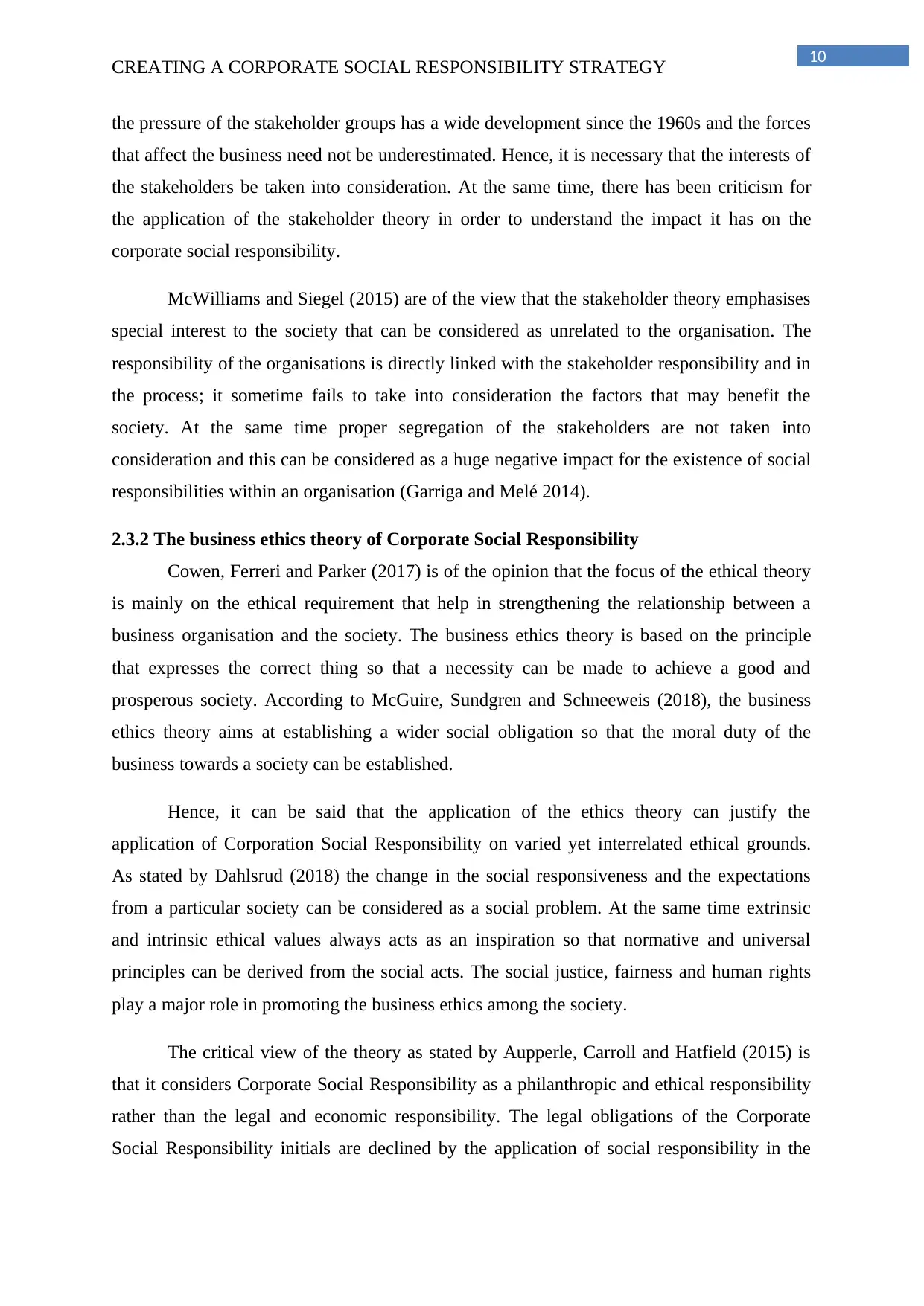
10
CREATING A CORPORATE SOCIAL RESPONSIBILITY STRATEGY
the pressure of the stakeholder groups has a wide development since the 1960s and the forces
that affect the business need not be underestimated. Hence, it is necessary that the interests of
the stakeholders be taken into consideration. At the same time, there has been criticism for
the application of the stakeholder theory in order to understand the impact it has on the
corporate social responsibility.
McWilliams and Siegel (2015) are of the view that the stakeholder theory emphasises
special interest to the society that can be considered as unrelated to the organisation. The
responsibility of the organisations is directly linked with the stakeholder responsibility and in
the process; it sometime fails to take into consideration the factors that may benefit the
society. At the same time proper segregation of the stakeholders are not taken into
consideration and this can be considered as a huge negative impact for the existence of social
responsibilities within an organisation (Garriga and Melé 2014).
2.3.2 The business ethics theory of Corporate Social Responsibility
Cowen, Ferreri and Parker (2017) is of the opinion that the focus of the ethical theory
is mainly on the ethical requirement that help in strengthening the relationship between a
business organisation and the society. The business ethics theory is based on the principle
that expresses the correct thing so that a necessity can be made to achieve a good and
prosperous society. According to McGuire, Sundgren and Schneeweis (2018), the business
ethics theory aims at establishing a wider social obligation so that the moral duty of the
business towards a society can be established.
Hence, it can be said that the application of the ethics theory can justify the
application of Corporation Social Responsibility on varied yet interrelated ethical grounds.
As stated by Dahlsrud (2018) the change in the social responsiveness and the expectations
from a particular society can be considered as a social problem. At the same time extrinsic
and intrinsic ethical values always acts as an inspiration so that normative and universal
principles can be derived from the social acts. The social justice, fairness and human rights
play a major role in promoting the business ethics among the society.
The critical view of the theory as stated by Aupperle, Carroll and Hatfield (2015) is
that it considers Corporate Social Responsibility as a philanthropic and ethical responsibility
rather than the legal and economic responsibility. The legal obligations of the Corporate
Social Responsibility initials are declined by the application of social responsibility in the
CREATING A CORPORATE SOCIAL RESPONSIBILITY STRATEGY
the pressure of the stakeholder groups has a wide development since the 1960s and the forces
that affect the business need not be underestimated. Hence, it is necessary that the interests of
the stakeholders be taken into consideration. At the same time, there has been criticism for
the application of the stakeholder theory in order to understand the impact it has on the
corporate social responsibility.
McWilliams and Siegel (2015) are of the view that the stakeholder theory emphasises
special interest to the society that can be considered as unrelated to the organisation. The
responsibility of the organisations is directly linked with the stakeholder responsibility and in
the process; it sometime fails to take into consideration the factors that may benefit the
society. At the same time proper segregation of the stakeholders are not taken into
consideration and this can be considered as a huge negative impact for the existence of social
responsibilities within an organisation (Garriga and Melé 2014).
2.3.2 The business ethics theory of Corporate Social Responsibility
Cowen, Ferreri and Parker (2017) is of the opinion that the focus of the ethical theory
is mainly on the ethical requirement that help in strengthening the relationship between a
business organisation and the society. The business ethics theory is based on the principle
that expresses the correct thing so that a necessity can be made to achieve a good and
prosperous society. According to McGuire, Sundgren and Schneeweis (2018), the business
ethics theory aims at establishing a wider social obligation so that the moral duty of the
business towards a society can be established.
Hence, it can be said that the application of the ethics theory can justify the
application of Corporation Social Responsibility on varied yet interrelated ethical grounds.
As stated by Dahlsrud (2018) the change in the social responsiveness and the expectations
from a particular society can be considered as a social problem. At the same time extrinsic
and intrinsic ethical values always acts as an inspiration so that normative and universal
principles can be derived from the social acts. The social justice, fairness and human rights
play a major role in promoting the business ethics among the society.
The critical view of the theory as stated by Aupperle, Carroll and Hatfield (2015) is
that it considers Corporate Social Responsibility as a philanthropic and ethical responsibility
rather than the legal and economic responsibility. The legal obligations of the Corporate
Social Responsibility initials are declined by the application of social responsibility in the
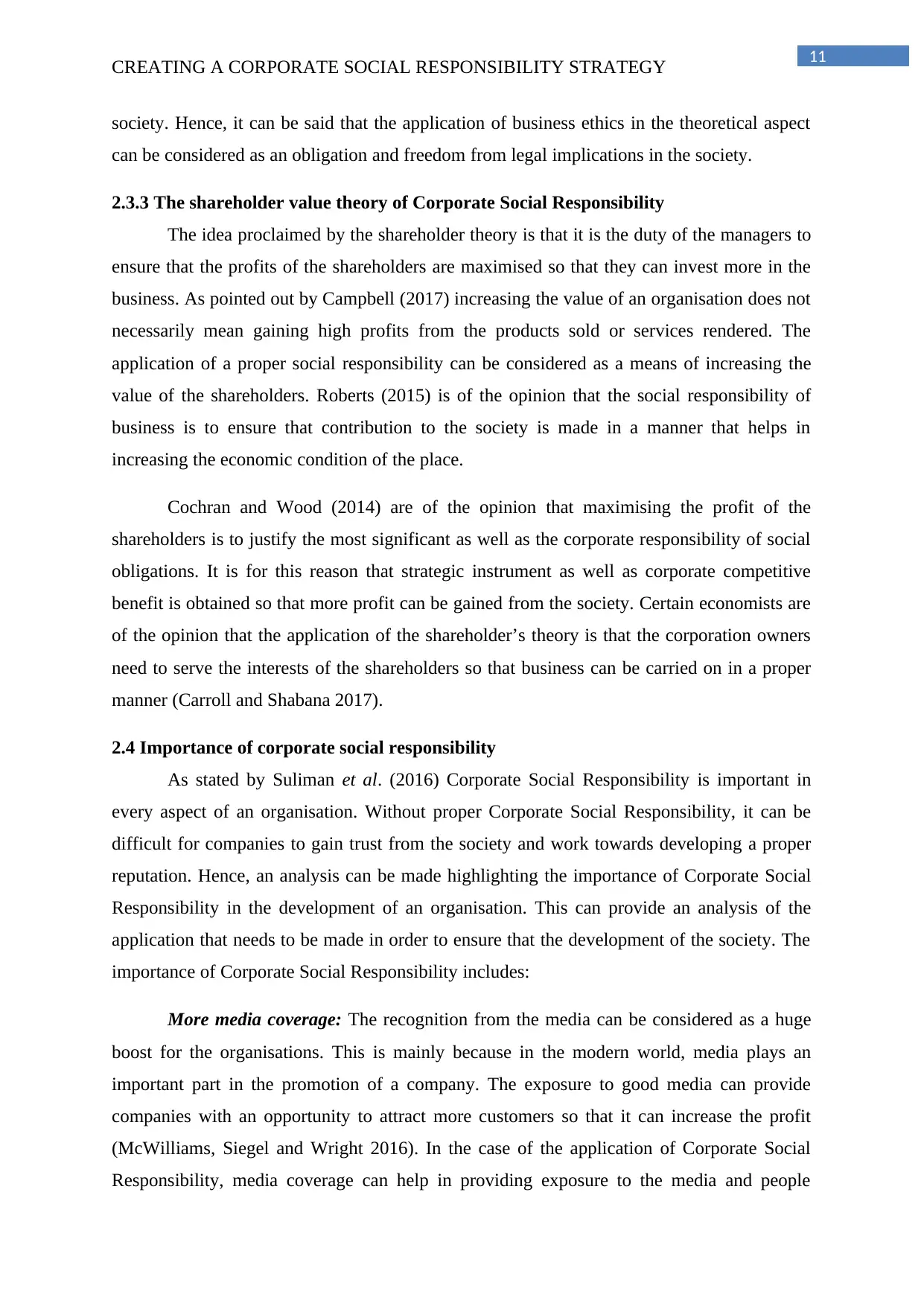
11
CREATING A CORPORATE SOCIAL RESPONSIBILITY STRATEGY
society. Hence, it can be said that the application of business ethics in the theoretical aspect
can be considered as an obligation and freedom from legal implications in the society.
2.3.3 The shareholder value theory of Corporate Social Responsibility
The idea proclaimed by the shareholder theory is that it is the duty of the managers to
ensure that the profits of the shareholders are maximised so that they can invest more in the
business. As pointed out by Campbell (2017) increasing the value of an organisation does not
necessarily mean gaining high profits from the products sold or services rendered. The
application of a proper social responsibility can be considered as a means of increasing the
value of the shareholders. Roberts (2015) is of the opinion that the social responsibility of
business is to ensure that contribution to the society is made in a manner that helps in
increasing the economic condition of the place.
Cochran and Wood (2014) are of the opinion that maximising the profit of the
shareholders is to justify the most significant as well as the corporate responsibility of social
obligations. It is for this reason that strategic instrument as well as corporate competitive
benefit is obtained so that more profit can be gained from the society. Certain economists are
of the opinion that the application of the shareholder’s theory is that the corporation owners
need to serve the interests of the shareholders so that business can be carried on in a proper
manner (Carroll and Shabana 2017).
2.4 Importance of corporate social responsibility
As stated by Suliman et al. (2016) Corporate Social Responsibility is important in
every aspect of an organisation. Without proper Corporate Social Responsibility, it can be
difficult for companies to gain trust from the society and work towards developing a proper
reputation. Hence, an analysis can be made highlighting the importance of Corporate Social
Responsibility in the development of an organisation. This can provide an analysis of the
application that needs to be made in order to ensure that the development of the society. The
importance of Corporate Social Responsibility includes:
More media coverage: The recognition from the media can be considered as a huge
boost for the organisations. This is mainly because in the modern world, media plays an
important part in the promotion of a company. The exposure to good media can provide
companies with an opportunity to attract more customers so that it can increase the profit
(McWilliams, Siegel and Wright 2016). In the case of the application of Corporate Social
Responsibility, media coverage can help in providing exposure to the media and people
CREATING A CORPORATE SOCIAL RESPONSIBILITY STRATEGY
society. Hence, it can be said that the application of business ethics in the theoretical aspect
can be considered as an obligation and freedom from legal implications in the society.
2.3.3 The shareholder value theory of Corporate Social Responsibility
The idea proclaimed by the shareholder theory is that it is the duty of the managers to
ensure that the profits of the shareholders are maximised so that they can invest more in the
business. As pointed out by Campbell (2017) increasing the value of an organisation does not
necessarily mean gaining high profits from the products sold or services rendered. The
application of a proper social responsibility can be considered as a means of increasing the
value of the shareholders. Roberts (2015) is of the opinion that the social responsibility of
business is to ensure that contribution to the society is made in a manner that helps in
increasing the economic condition of the place.
Cochran and Wood (2014) are of the opinion that maximising the profit of the
shareholders is to justify the most significant as well as the corporate responsibility of social
obligations. It is for this reason that strategic instrument as well as corporate competitive
benefit is obtained so that more profit can be gained from the society. Certain economists are
of the opinion that the application of the shareholder’s theory is that the corporation owners
need to serve the interests of the shareholders so that business can be carried on in a proper
manner (Carroll and Shabana 2017).
2.4 Importance of corporate social responsibility
As stated by Suliman et al. (2016) Corporate Social Responsibility is important in
every aspect of an organisation. Without proper Corporate Social Responsibility, it can be
difficult for companies to gain trust from the society and work towards developing a proper
reputation. Hence, an analysis can be made highlighting the importance of Corporate Social
Responsibility in the development of an organisation. This can provide an analysis of the
application that needs to be made in order to ensure that the development of the society. The
importance of Corporate Social Responsibility includes:
More media coverage: The recognition from the media can be considered as a huge
boost for the organisations. This is mainly because in the modern world, media plays an
important part in the promotion of a company. The exposure to good media can provide
companies with an opportunity to attract more customers so that it can increase the profit
(McWilliams, Siegel and Wright 2016). In the case of the application of Corporate Social
Responsibility, media coverage can help in providing exposure to the media and people
⊘ This is a preview!⊘
Do you want full access?
Subscribe today to unlock all pages.

Trusted by 1+ million students worldwide
1 out of 53
Related Documents
Your All-in-One AI-Powered Toolkit for Academic Success.
+13062052269
info@desklib.com
Available 24*7 on WhatsApp / Email
![[object Object]](/_next/static/media/star-bottom.7253800d.svg)
Unlock your academic potential
Copyright © 2020–2026 A2Z Services. All Rights Reserved. Developed and managed by ZUCOL.





